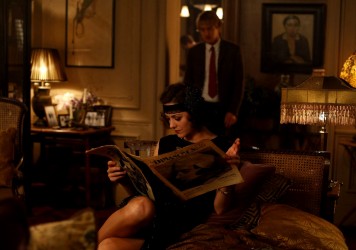Woody Allen follows up the biggest hit of his career with an exercise in smug mediocrity.
Woody Allen stumbled onto a surprise hit with 2011’s Midnight in Paris, in which an earnest writer finds himself magically transported to the City of Light circa 1920, where he hobnobs with the likes of Ernest Hemingway and Luis Buñuel.
Despite the film’s supposed critique of living in the past, it mostly got off by luxuriating in an airbrushed version of an overly fetishised time and place. But for all the film’s conceptual rottenness, a winning lead performance by Owen Wilson and some fun wink-wink cultural references made it surprisingly watchable.
Alas, no such compensatory qualities mark the Woodman’s latest, the mirthless To Rome with Love. One measure of the film’s staleness is the appearance of the writer/director/actor himself. Playing Jerry, a retired music producer, he is introduced on a transatlantic flight doing his classic neurotic shtick, cowering in terror whenever the plane hits turbulence. When he arrives in Rome with his wife to meet his daughter’s Italian beau and family, Jerry baulks at his putative in-laws’s left-leaning politics, worrying that his little girl is marrying into a family of communists.
Yes, we’re not supposed to take him very seriously, and his viewpoint is countered by more reasonable voices, but the fact that Allen’s tired grumbling still seems to be locked into a Cold War mindset says everything about just how out of touch his approach now is.
One could reiterate the usual litany of complaints about Allen’s narrow, privileged conception of the world (the fact that the Eternal City, like Paris and New York before it, is reduced to pretty cultural signifiers), but To Rome with Love actually puts the filmmaker’s ambivalence about materialism and fame front and centre. Jerry himself may equate money and happiness, but in the film’s four non- interlocking narratives, these concerns are given slightly more varied treatment.
In one storyline, an ordinary middle-aged Roman (Roberto Benigni) wakes up to find himself a sudden celebrity for no good reason. Soon, news crews are asking about every detail of his life, while filming banal activities as if they were major events. Not only does this slight conceit seem like a rehash of funnier Allen moments (remember the live sex in Bananas?), but its commentary on the fleeting nature of celebrity is both obvious and underdeveloped to the point where the segment’s inconclusive finale feels more confused than ambiguous.
The other narratives, involving a young architecture student falling for a celebrity- obsessed actress, a newlywed who has to pretend to be married to a whore (Penélope Cruz, once more typecast by Allen), and Jerry again, who conceives of a plan to take an Italian opera singer on stage singing in the shower, deal more or less with the same themes, reaching a variety of perfunctory conclusions through their own laugh-neutral storylines.
As the film chugs to an end, there’s no surer indication of its lack of inspiration than Cruz’s hooker visiting the Sistine Chapel and cracking a joke about how, like Michelangelo painting the ceiling of that structure, she too earns her living lying on her back. Allen’s juvenile sex jokes, like his worldview, have regressed rather than evolved.
Published 13 Sep 2012
How will Allen follow up the biggest hit of his career?
There are plenty of storylines but few laughs this time around.
The film’s litany of bad ideas overshadows any of its thematic concerns.

Richard Linklater makes it a trilogy for his beloved walkie-talkie love saga. And this one’s possibly the best of the lot.

Midnight in Paris isn’t a clutch at yesteryear; it’s a statement that Allen still has something left to say.